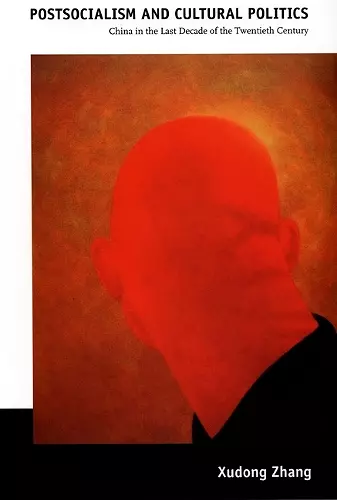Postsocialism and Cultural Politics
China in the Last Decade of the Twentieth Century
Format:Paperback
Publisher:Duke University Press
Published:25th Apr '08
Currently unavailable, and unfortunately no date known when it will be back

Cultural analysis of the ongoing and pervasive presence and influence of socialism in the supposedly post-socialist China of the 1990s
Offers a critical analysis of China's "long 1990s," the tumultuous years between the 1989 Tiananmen Square crackdown and China's entry into the World Trade Organization in 2001. This title examines the reactions of intellectuals, authors, and filmmakers to the cultural and political shifts in 1990s China.In Postsocialism and Cultural Politics, Xudong Zhang offers a critical analysis of China’s “long 1990s,” the tumultuous years between the 1989 Tiananmen Square crackdown and China’s entry into the World Trade Organization in 2001. The 1990s were marked by Deng Xiaoping’s market-oriented reforms, the Taiwan missile crisis, the Asian financial crisis, and the end of British colonial rule of Hong Kong. Considering developments including the state’s cultivation of a market economy, the aggressive neoliberalism that accompanied that effort, the rise of a middle class and a consumer culture, and China’s entry into the world economy, Zhang argues that Chinese socialism is not over. Rather it survives as postsocialism, which is articulated through the discourses of postmodernism and nationalism and through the co-existence of multiple modes of production and socio-cultural norms. Highlighting China’s uniqueness, as well as the implications of its recent experiences for the wider world, Zhang suggests that Chinese postsocialism illuminates previously obscure aspects of the global shift from modernity to postmodernity.
Zhang examines the reactions of intellectuals, authors, and filmmakers to the cultural and political conflicts in China during the 1990s. He offers a nuanced assessment of the changing divisions and allegiances within the intellectual landscape, and he analyzes the postsocialist realism of the era through readings of Mo Yan’s fiction and the films of Zhang Yimou. With Postsocialism and Cultural Politics, Zhang applies the same keen insight to China’s long 1990s that he brought to bear on the 1980s in Chinese Modernism in the Era of Reforms.
With this new book, Zhang has provided an indispensible critical lens through which to discern the dizzying speed of social change and dazzling complexity that characterize the contemporary Chinese condition as symptomatic of ‘the Reagan, Thatcher, and Deng Xiaoping Revolution.’” - David Leiwei Li, Comparative Literature
“Postsocialism and Cultural Politics is, among many things, both well organised and easy to navigate. . . . [Zhang’s] application of postsocialism to literature and film is deft and nuanced, and proffers arresting insights into the works themselves as well as the socio-political situation they exist in. Zhang's subtle understanding of Deleuze, Adorno, Walter Benjamin, and Derrida underpins his analysis of Chinese literature and film. His examples drawn from the works of Baudelaire, Dickens, nineteenth-century German oil painting, Balzac, and Kafka lends Zhang's work a cosmopolitan quality, and draws parallels beyond the parameters of his subject. Postsocialism and Cultural Politics is a thorough and compelling examination of the socio-political situation in 1990s China.” - Joshua Hoey, M/C Reviews
“An extraordinarily rich panorama of the cultural and socio-political debates in China today. Xudong Zhang’s analyses are not only models of theoretical interpretation, the whole book can stand as a triumphant demonstration of the way in which readings of novels, films, social and political texts, and the polemics around them can be positioned to illuminate each other.”—Fredric Jameson, Duke University
“Xudong Zhang has produced a brilliant and compelling study of the various forces struggling with one another in China during the pivotal decade that followed the failure of the 1989 social movement. Through a deft explication of the complicated factors at play—summed up wonderfully in a clear exposition of the collision between postmodernism and postsocialism—Zhang is able to provide a uniquely nuanced picture of the China that has emerged as such a formidable force in our globalized age.”—Theodore Huters, author of Bringing the World Home: Appropriating the West in Late Qing and Early Republican China
“Postsocialism and Cultural Politics is, among many things, both well organised and easy to navigate. . . . [Zhang’s] application of postsocialism to literature and film is deft and nuanced, and proffers arresting insights into the works themselves as well as the socio-political situation they exist in. Zhang's subtle understanding of Deleuze, Adorno, Walter Benjamin, and Derrida underpins his analysis of Chinese literature and film. His examples drawn from the works of Baudelaire, Dickens, nineteenth-century German oil painting, Balzac, and Kafka lends Zhang's work a cosmopolitan quality, and draws parallels beyond the parameters of his subject. Postsocialism and Cultural Politics is a thorough and compelling examination of the socio-political situation in 1990s China.” -- Joshua Hoey * M/C Reviews *
With this new book, Zhang has provided an indispensible critical lens through which to discern the dizzying speed of social change and dazzling complexity that characterize the contemporary Chinese condition as symptomatic of ‘the Reagan, Thatcher, and Deng Xiaoping Revolution.’” -- David Leiwei Li * Comparative Literature *
ISBN: 9780822342304
Dimensions: unknown
Weight: 503g
352 pages